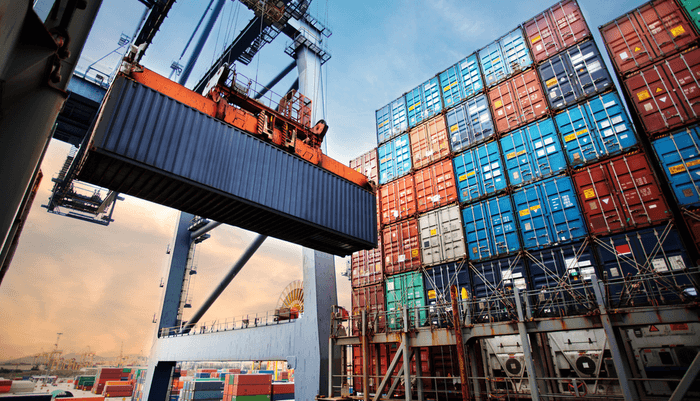Nigerian manufacturers are experiencing a significant surge in exports to other African countries, driven by the naira’s devaluation.
The weaker currency has enhanced their competitive edge in the regional market, encouraging them to explore new export opportunities and earn more naira to finance production needs.
Manufacturers have adopted various strategies to leverage this opportunity, such as establishing depots as subsidiaries in target countries, exporting in smaller volumes, building relationships with local markets, understanding cultural and regulatory landscapes, and conducting thorough economic and financial analyses to identify the right products or services for export.

“To facilitate exports to certain countries, we had to open depots as subsidiaries to ensure smooth distribution,” said Paul Odunaiya, Managing Director/CEO of Wemy Industries Limited.
Recent reports indicate that the four largest publicly-listed manufacturers—Unilever Nigeria Plc, Nestlé Nigeria Plc, Okomu Oil Palm Plc, and Dangote Cement Plc—collectively saw their export revenues surge by 201.1 percent to N387.2 billion in the first quarter of 2024, the highest in at least nine years. This is a significant increase from N128.6 billion in the first quarter of the previous year.
“During the quarter, we intensified our export efforts, sending seven ships from Nigeria to Ghana and Cameroon,” said Arvind Pathak, CEO of Dangote Cement. “Our Nigerian exports increased by 87.2 percent, demonstrating our commitment to expanding our regional market presence and capitalizing on our export-to-import strategy.”
Data from the National Bureau of Statistics (NBS) shows that Nigeria’s trade with other African nations rose by 39.5 percent to N3.71 trillion in 2023, the highest in four years, up from N2.66 trillion in 2022.
READ ALSO: Naira Strengthens to N1,245/$ in Parallel Market Amidst Market Fluctuations
“Building relationships with other African countries is crucial for exports,” said Uchenna Uzo, Professor of Marketing and Faculty Director at Lagos Business School. “Manufacturers have expanded their networks beyond Nigeria, allowing them to identify the optimal timing and locations for product entry within Africa.”
The naira suffered a nearly 30 percent devaluation this year following a 40 percent devaluation last June due to FX reforms implemented by the Central Bank of Nigeria (CBN) to revive the economy. While the naira has continued to depreciate, the West African CFA franc has appreciated, making Nigerian-produced goods cheaper compared to those from other African countries.
At the official market, the naira depreciated from 463.38/$ on June 9, 2023, to N1,476.95/$ as of June 4, 2024. The naira also weakened against the West African CFA franc, going from 0.76 per CFA1 on June 9 to 2.48 per CFA1 as of June 4.
“We are working on exporting some of our locally sub-distributed products,” said Comfort Ogunife, CEO of Joyinten Limited. “Our company can earn more by serving small food industries in some African countries.”
Odiri Erewa-Meggison, Chairman of the Manufacturers Association of Nigeria Export Promotion Group (MANEG), noted that large manufacturers have a stronger ability to weather government policy impacts due to their substantial internal resources. “Despite being affected by government policies, large manufacturers can still optimize their export potential,” Erewa-Meggison said.
Experts argue that Nigeria’s trade policy has historically focused on import substitution rather than boosting exports. The Export Expansion Grant (EEG), Nigeria’s primary incentive scheme for exporters, has been plagued by corruption allegations and administrative inefficiencies, causing many exporters to lose trust in the program.
“We need to support exporters to bring in much-needed foreign exchange and eliminate bottlenecks,” said Obiora Madu, Director-General of the African Centre for Supply Chain. “The country is not strategic or intentional enough about exports.”
READ ALSO: Naira Tops Performance Charts in April, New Report Reveals
The Federal Government launched the Trade Policy of Nigeria (2023-2027) last December, focusing on accelerating pro-poor growth through market-oriented policies. However, a report by Agora Policy criticized the policy for failing to prioritize boosting exports amidst declining domestic demand.
Paul Odunaiya of Wemy Industries suggests the government consider trade credits due to long lead times for trucking goods to African countries. “A reliable African bank with branches in multiple countries is also crucial for facilitating payments,” he added.
Femi Egbesola, National President of the Association of Small Business Owners of Nigeria, emphasized the potential of liberalized exports for small businesses. “Intra-Africa trade will help small businesses grow, upscale, and employ more people, strengthening the naira and generating more government revenue.”
On Tuesday, Wale Edun, Minister of Finance and Coordinating Minister of the Economy, presented the Accelerated Stabilisation and Advancement Plan (ASAP) to address challenges affecting reform initiatives and stimulate development across various economic sectors. Some executive orders to bolster ASAP include tax exemption for repatriated export proceeds of services and intellectual property, zero-rated VAT for all non-oil exports, and relaxation of restrictions on the use of export proceeds.



